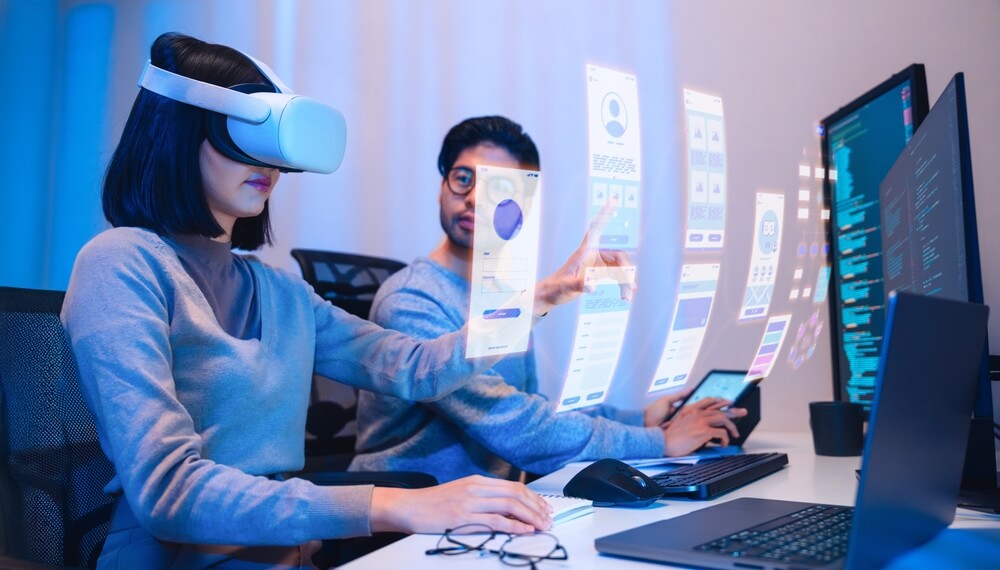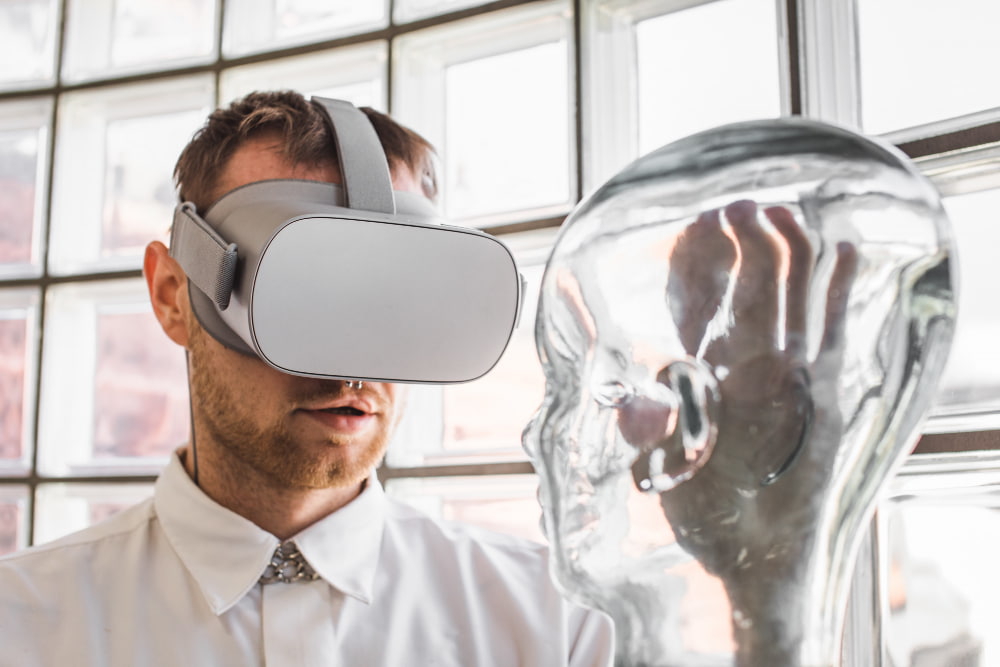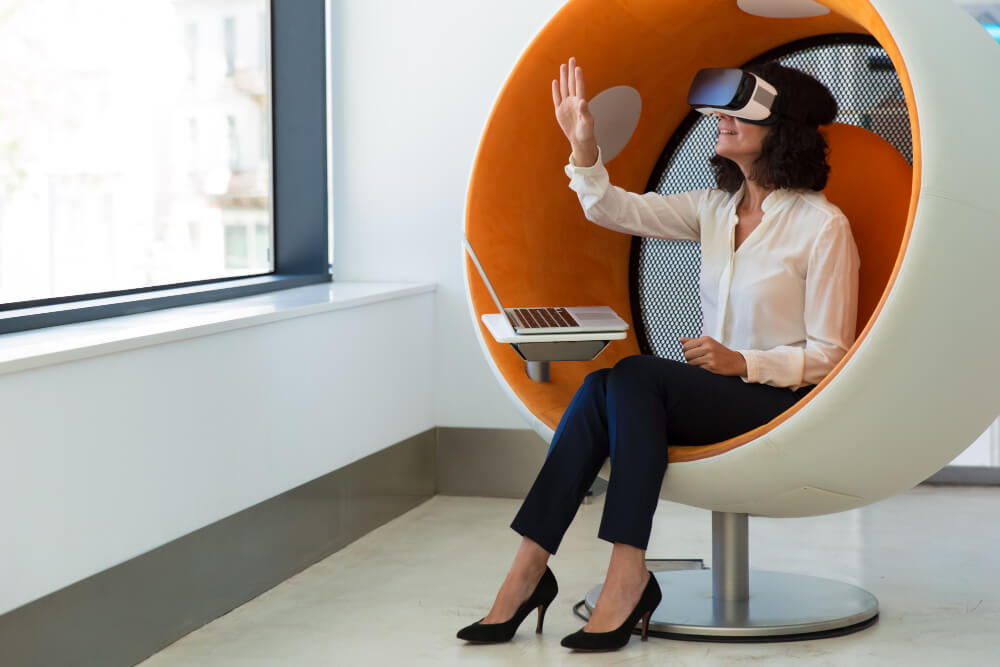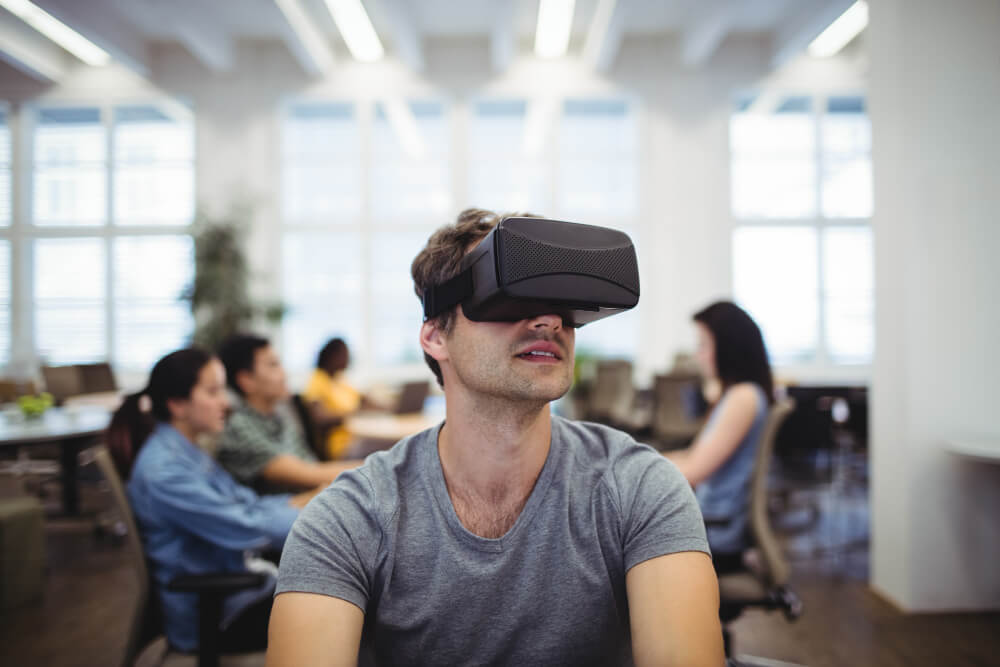Workplace Training for Gen Z: The Importance of Digital and VR Training Solutions
Table of Contents:
Antiquated training solutions can quickly become overbearing for Gen Z workers who grew up surrounded by technology. If you sit down a new Gen Z hire in front of several dozen pages of documentation as part of their onboarding process, they’ll burn out faster than a candle left in a gusty wind. And it’s not even their supposedly ephemeral attention spans that make traditional training ineffective—it’s all about wasting the potential of technology to make the process smoother. That’s where VR training for Gen Z employees can turn the tables, and it’s precisely the topic we’ll be covering today.
Key Takeaways:
1. Gen Z’s Workplace Expectations: Gen Z values flexibility, work-life balance, and purpose-driven work. They expect companies to integrate technology into their training processes to enhance their well-being and make tasks easier.
2. Limitations of Traditional Training: Traditional training methods, such as lengthy presentations and static documents, fail to engage Gen Z employees, leading to low engagement, poor retention, and inefficient onboarding.
3. Benefits of VR Training for Gen Z: VR training provides immersive, engaging, and flexible learning experiences that align with Gen Z’s tech-savvy nature. It boosts engagement, enhances knowledge retention, and allows employees to learn at their own pace.
4. Enhanced Learning and Development: VR training offers scalable, hands-on learning experiences, reduces errors, and supports continuous learning. It also enables businesses to track performance and measure the effectiveness of training programs.
5. Futureproofing Workforce Training: By adopting VR training, companies can futureproof their onboarding and upskilling processes, ensuring they stay ahead in a competitive market and meet the evolving needs of younger generations like Gen Z.
What Makes Gen Z Workers Different?
People born in Generation Z have seen rapid technological advancement throughout their lives, alongside looming problems such as growing social inequality and climate concerns. It’s no wonder that, as they witness these issues become ever more pressing and possibly insurmountable despite progressing tech, they become disillusioned and pragmatic, shifting their priorities due to what older generations can rather hastily call entitlement.
Many Gen Z workers emphasize pursuing a deeper purpose in life instead of just going after paychecks. This approach, which manifests itself through prioritizing mental health and personal well-being, showcases Gen Z’s need for balance in all things—work life included.
As such, while superficial company culture initiatives certainly won’t impress them, a commitment to making their daily tasks easier certainly will. For example, integrating technological solutions into the workplace to enhance well-being will be seen as a welcome and necessary addition, more so than just a tool to be used to achieve the company’s bottom line.
Why Are Traditional Workplace Training Methods Not Enough Anymore
Traditional training methods like lengthy presentations and static documents have been a staple in onboarding new hires for a good while. They don’t require many resources, are pretty hands-off, and once you’ve prepared the necessary materials, you’re good to go, possibly even for years to come.
But some think that these methods have overstayed their welcome. They often fail to engage modern learners, especially those from the younger generations. Gen Z’s workplace expectations are vastly different, and they’re much more likely to spot and bemoan the problems with traditional approaches, such as:
- Low Engagement: Passive learning formats increase the trainee’s susceptibility to distractions.
- Limited Retention: People in general—no, not just Gen Z!—retain knowledge and information more actively and for longer periods when the learning process is more active and involving.
- Time-Intensive: Endless reading without the help of a mentor can unnecessarily extend the onboarding period without offering that great of a payoff.
The Importance of Digital Training for Gen Z
As a generation that grew up surrounded by technology, Gen Z craves tech-powered immersive experiences that combine engagement with effective learning. By limiting the friction associated with traditional training, your organization can do more than just improve its onboarding; it can futureproof it to attract top talent from younger generations—ambitious, success-hungry individuals for whom technology is second nature and who can revolutionize your business.
The fact of the matter is that modern digital training solutions like VR platforms align perfectly with how Gen Z (soon to be followed by Generation Alpha, by the way) consumes and processes information. With an onboarding toolkit designed to make learning dynamic and flexible, you can obtain a workforce that improves its scores drastically through learning by doing and adjusting the study pace to their own needs. After all, an employee who reads through 60 pages of boring reports won’t be able to readily bring that knowledge to the table once the arbitrary onboarding period is over.
Key Modern Workplace Expectations of Gen Z
With the basic tenets separating Gen Z from other generations out of the way, let’s have a quick look at what most Gen Z employees might expect from a workplace:
Purpose-Driven Work
As explained above, the younger generation won’t appreciate working only for a paycheck. For Gen Z’ers, having a greater purpose, being aware of it, and deriving satisfaction from it will go way further in terms of motivation than a standard 9-to-5 ever could.
Continuous Learning
A clear career development plan goes a long way for Gen Z workers. They don’t want to just hang on to a promise that may or may not come to fruition. They’ll likely expect and definitely appreciate a well-defined path, so provide opportunities for growth and upskilling.
Caring for mental health in the workplace
To attract and retain Gen Z employees, companies need to integrate at least some mental health perks and benefits. Here are a few ideas to make Gen Z workers feel that much more listened to:
Flexibility and Work-Life Balance
For Gen Z’ers, remote work and flexible schedules aren’t just perks—they’re necessities. Gen Z people value the ability to work when and where they’re most comfortable.
Offering Mental Health Benefits
Providing access to a mental health helpline or therapy sessions can work be that much needed nod toward employee well-being that Gen Z needs. Flexible benefits packages that include these resources are held in high regard, especially given the otherwise limited affordability of counseling and therapy.
Leveraging Technology
Given the generation’s aptitude toward digital tools, employers should consider providing access to virtual wellness programs that boost mental health. One such idea could be to use VR technology, like the Mazer Trainer, which can easily transport users into a serene meditation chamber to relax and de-stress when needed.
Using VR to Supercharge Your Training and Upskilling
Virtual reality solutions can take digital training to the next level, and using VR training for Gen Z employees is simply a perfect match. Through engaging platforms like the Mazer Trainer, you can offer your employees immersive experiences that mimic real-world scenarios.
The best part? These solutions are so versatile, they can be utilized in almost any industry. Customer service? Definitely. Operating complex machinery? Absolutely? Performing complex surgical procedures? You bet.
What’s more, the fully immersive environments make the training experience more enjoyable and memorable, boosting knowledge retention by a significant margin. Introducing such measures can without a doubt create a learning environment that’s more accommodating for Gen Z employees.
Over time, this will translate into a more efficient business as your company begins to reap the benefits of shorter onboarding, smarter employees, and less frustration with outdated training methods. Plus, augmented reality allows you to later on restructure your organization in other ways, like VR upskilling and reskilling, too.
The Takeaway
The future of workplace training will be (re)shaped by the increasing share of Gen Z employees on the market. The shortcomings of traditional methods will become gradually more apparent, allowing digital and VR solutions to shine brighter than before and usher in a new age of scalable and engaging training,
If you’d like to integrate these cutting-edge methods into your training methods and remain ahead of the curve, contact us today and see how Mazer Trainer can transform your business.
What makes Gen Z workers different from previous generations?
Gen Z workers have grown up in a tech-driven world and prioritize mental health, work-life balance, and purpose-driven work. They seek meaningful careers that align with their values, and they expect companies to use technology to enhance their well-being and make tasks easier. Unlike older generations, they value flexibility, continuous learning, and opportunities for growth.
Why are traditional workplace training methods not effective for Gen Z?
Traditional training methods, such as lengthy presentations and static documents, often fail to engage Gen Z employees. They tend to be passive learners in these formats, which leads to low engagement and poor retention. Additionally, these methods can be time-consuming and fail to capture their attention, making onboarding less efficient and effective for today’s workforce.
How does VR training address the needs of Gen Z workers?
VR training provides Gen Z workers with immersive, engaging, and flexible learning experiences that align with their tech-savvy nature. By simulating real-world scenarios, VR allows them to practice skills actively and at their own pace, leading to better retention and quicker application of knowledge. VR also helps create a training environment that’s more dynamic and tailored to the needs of modern learners.
What are the key benefits of using VR for training Gen Z employees?
VR training offers multiple benefits for Gen Z employees, including higher engagement, better knowledge retention, and more efficient onboarding. By providing immersive experiences, it allows them to practice complex tasks in a safe environment, reducing the risks of errors and increasing their confidence. VR also supports continuous learning and upskilling, catering to their need for personal and professional growth.
How can VR training be used to improve workplace learning and development?
VR training can revolutionize workplace learning by providing scalable, immersive, and hands-on learning experiences. It reduces the need for physical space, lowers training costs in the long run, and ensures consistent delivery of high-quality training across different teams. VR also allows for real-time performance tracking, helping businesses identify skill gaps and measure the effectiveness of their training programs.

Author: Rafał Siejca
Rafal has over twenty years of corporate experience, including roles at Millennium Bank, Comarch, and leading software teams at PZU, one of Europe’s largest insurance companies. As one of Poland’s few true VR experts with a decade of experience, he ensures timely, high-quality project delivery as CEO and CTO.










